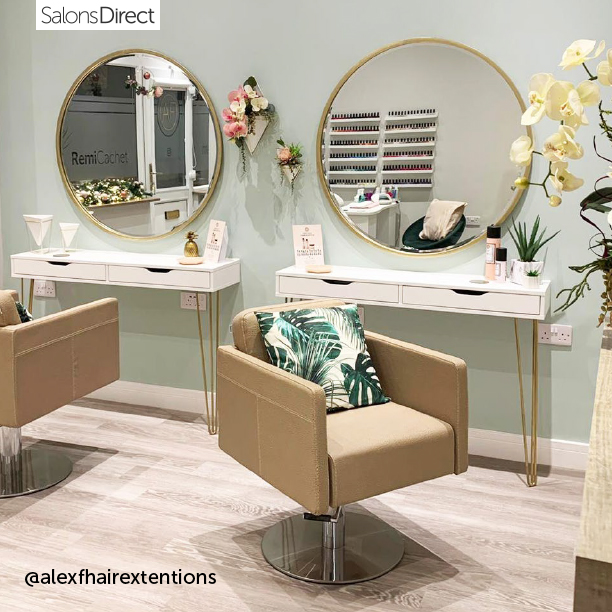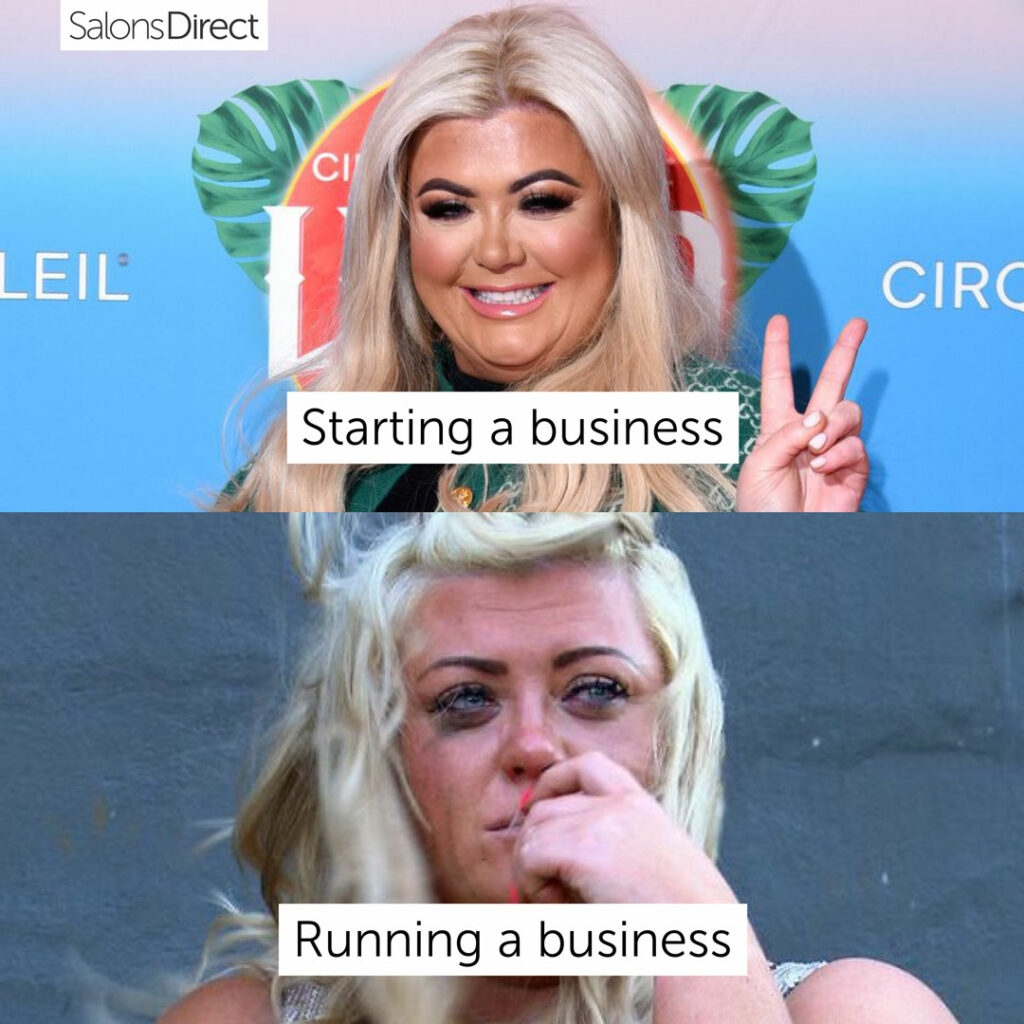
Are you weighing up the pros and cons of working in a salon vs being self-employed and freelancing? Whether you’re recently qualified or considering changing the way you currently work, both options have benefits and considerations that will undoubtedly impact the route that you take. To help you make a more informed decision, we’ve created this in-depth guide covering everything you need to know about freelancing vs being employed in a salon.
The benefits and considerations of working for somebody else
For some hairdressers and beauty therapists, working for somebody else in an existing salon business is the ideal choice. Here are some of the key benefits and considerations of choosing this option…
1. You will earn a regular monthly income
The benefits: Each month you will be paid your salary, which, before it reaches you, will have been deducted of any tax or student loans that you owe. You will know exactly how much you are earning each month and for people who like consistency and regularity working in a salon and earning a regular wage is the right choice for them.
What to consider: When you work for somebody else, your earnings may be limited to your annual income, which for some salon professionals may start anywhere between £12,000 and £14,000. You will need to negotiate pay rises or wait for performance reviews to attain more money within your current salon which may not happen as quickly as you’d like. Alternatively, you may need to move on more regularly to keep earning more.
Find out more: Wages in the salon industry
Top Tip: If you are considering taking on some out-of-hours work to top up your wage, always check your contract beforehand or discuss it with your line manager to ensure this is permitted.
2. You will be entitled to legal employee benefits
The benefits: When you work for an established business, you are entitled to receive sick pay, holiday pay and maternity or paternity pay. The details of these entitlements will be outlined in your contract or company handbook.
Find out more: Why your salon business needs an employee handbook
3. You will work as part of an established team
The benefits: When you are employed within an existing salon business, you will automatically become part of a team, which at times may feel like extended family. Being part of a group allows you to build a network around you for both support and education. This is especially beneficial for stylists and beauty therapists just starting out in their careers as they can observe and work within all facets of salon life whilst remaining under the wing of their colleagues.
What to consider: Be mindful that working within the same team for an extended period of time may not push you out of your comfort zone. The familiarity of sticking with the same team may slow down your ability to acquire new skills and techniques from other industry professionals.
4. You can learn and develop your craft under an established salon’s name
This is relevant to salon businesses of all sizes but holds particular resonance for anybody working within a chain salon business where employees are trained in a specific way.
The benefits: When you work for somebody else, you will play a part in upholding their reputation. You will have been trained to provide services carried out to their gold standard via their approved training models. You may also be able to attend training courses, industry conferences and trade shows on behalf of the salon business you work for.
What to consider: When working for someone else, you may feel somewhat restricted. You may want more flexibility in how you do things, including particular techniques, salon protocols and the professional salon products that you use.
Learn more: How To Ensure Your Salon Training Sessions Are Successful
The benefits and considerations of being a freelance stylist or beauty therapist
For some industry professionals, being in charge of their own destiny and dictating how and when they do things is the best option for them. However, going solo comes with added responsibilities such as paying your own taxes, not having entitlements such as sick pay and working with uncertainties such as finding clients and making ends meet. Here are some of the key benefits and considerations of choosing this option.
1. You can set your own working hours
The benefits: The ability to work when you want and for how long you want is particularly beneficial if you have childcare or other time-sensitive commitments. By setting your own working pattern, you can be more flexible in the planning and running of your life.
What to consider: In the service industry, clients are more likely to be booking appointments around their own lifestyle commitments, which may be at or around the same time as yours. Not being able to service clients at a time that suits the masses may lead to not attaining their business long-term.
Related: How to attract and retain clients as a mobile hairdresser
2. You have flexibility over how you work
The benefits: An overarching benefit of working for yourself is the flexibility you are afforded. You may decide that during a peak season, such as Christmas time, you want to up your hours, and in other months you may want to cut your hours back. You may decide to work from your home, or work from a salon, when you work for yourself, the choice is entirely yours! Another flexibility factor is that you can also be selective on which professional salon products you use as you are not bound to one brand or affiliation.
What to consider: When you have worked hard to build up a loyal client base, during periods where you are cutting your appointments back, clients may find this inconvenient and find somewhere else to take their custom.
3. You can set your own pricing structure
The benefits: As a freelancer, you can set your prices at a level that works for you. This is particularly beneficial if you have a particular financial goal in mind.
What to consider: You need your prices to remain competitive to encourage clients to not only try out your service but also stick with you. Once you have established the base level of income that you need to earn to keep afloat; you can then factor in a margin on top and play with your pricing structure.
Related: A guide to going freelance as a hairdresser
4. You can work in multiple places
The benefits: Choosing where you work can lead to more clients and a more varied day at work. You may rent a chair between a couple of different salons, giving you the social aspect of work and the ability to acquire new skills from each establishment.
What to consider: You will have limited control over the salons operating hours and way of working. Whilst you can be flexible with your clients, you will work within the parameters and facilities of the salon you rent a chair from.
Discover: Advice on renting a hairdressing chair
Top Tip: Speak to industry professionals who are already freelancing to garner a real-world perspective on aspects they enjoy and the challenges they face. For more information, check out Salons Direct’s guide to going freelance as a hairdresser.
Preparing to go solo?
You can purchase your professional hair, beauty and nail supplies all in one place here at Salons Direct -Choose from our wide range of products to suit all budgets and needs.
For the ability to take direct payments from your clients, we recommend taking a look at our range of SumUp card readers. You can choose from contactless card readers or 3G payment kits for the ability to accept payments anytime and anywhere! You can also shop for all your salon stationery essentials here at Salons Direct, including appointment cards, gift vouchers, and appointment books.
Discover our guide: Mobile vs a salon. Which is best for your new hair or beauty business?
Working In A Salon vs Freelancing FAQs
Now that we have considered the pros and cons of working in a salon vs freelancing, we’ll answer some of the most frequently asked questions.
Q: Which route should you choose if you are starting your hairdressing journey?
If you are just starting out in the industry, you may find that you can build on your skills and learn how to successfully work with clients more effectively if you work within an existing salon business. You will have the guidance of your colleagues and your line manager’s motivation to help you become the best you can be. Whatsmore, you won’t have the challenging responsibilities and overheads of working for yourself, this is especially beneficial when you are first finding your feet.
Q: How much can you earn when working in a salon vs freelancing?
What you can earn either in the salon or as a freelancer depends on your chosen discipline, whether it be hair, beauty or nails, the kind of salon business you work for, your skill set, where you are based and the number of clients you service. With so many factors to consider, it is impossible to give a concrete figure, however, according to payscale.com ‘£8.70 per hour’ is the average hourly rate for in-salon hair and beauty professionals.
And according to freelancerclub.net
“The average hourly rate for a mobile Hair Stylist in the UK ranges from £15 per hour (beginner) to £50 per hour (experienced).
Q: How do taxes work if you freelance?
We have previously created two in-depth guides on how taxes work when you freelance, which we recommend checking out…
- The Self-Employed Hairdresser’s Guide to Tax Returns
- Preparing for tax returns: A guide to booking keeping and expenses for hairdressers
As a general view, registering with HM Revenue & Customs (HMRC) is the first place to start. You can register as a sole trader or a limited company, and a qualified accountant can help you review which option is best for you based on your actual and projected income. The next step is maintaining a record of all your incomings and outgoings to be able to present these to your accountant as part of your annual tax return.
Top Tip: We always recommend consulting with an appropriate, independent expert before you start as a freelancer.
Q: Do you need your insurance to work freelance?
As a freelance hairdresser or beauty therapist, you must have public and product liability insurance before working with clients. This ensures that you are covered if a client makes a claim. For more information on insurance, take a look at our guide: The Importance of Choosing the Right Insurance For Your Beauty Business.
What will you decide?
There are many factors to weigh up when deciding if freelancing or working for somebody else is the right option for you. We hope this guide has helped you in making your decision. Good luck!
Shop professional salon supplies at Salons Direct
The Salons Direct blog is your trusted source for industry news, product releases, how-to guides and more!
Time for more?
How to create a more inclusive salon business | The best salon booking apps to use in 2022 | A Week In the Life of a Freelance Hairdresser in Lockdown – With L’Oreal Professionnel
Follow Salons Direct on Instagram | Find us on TikTok





